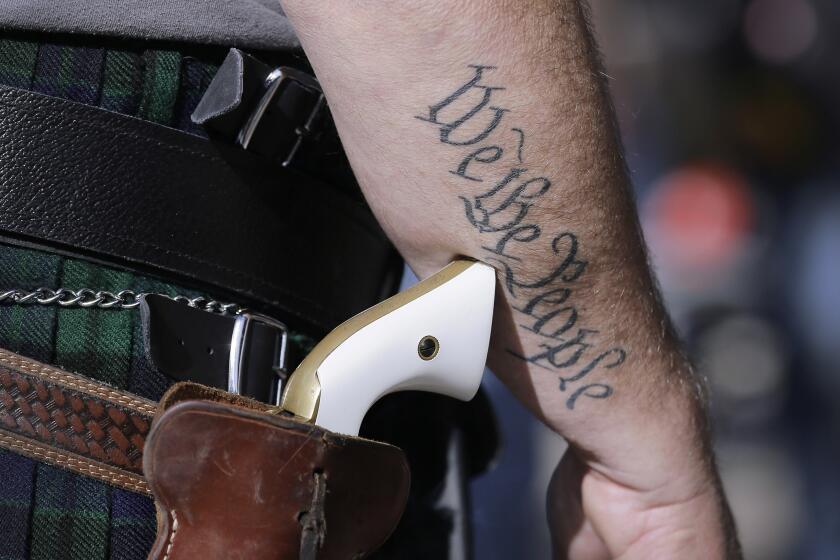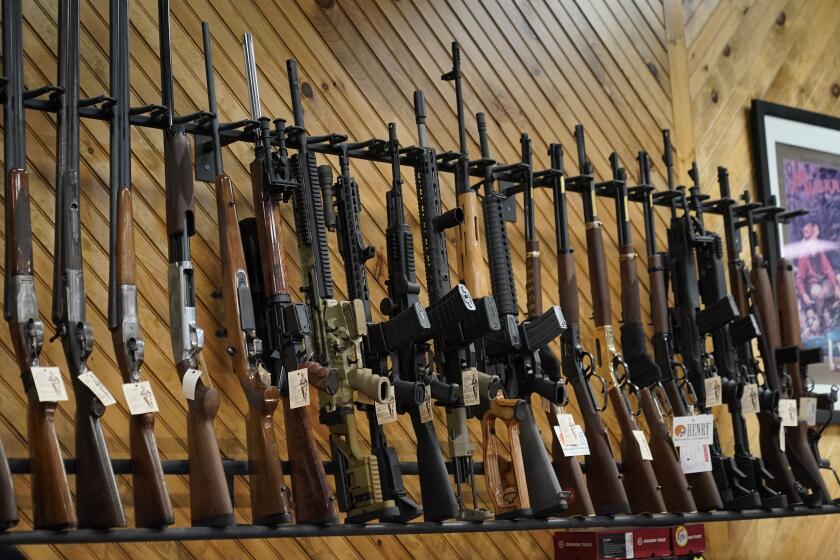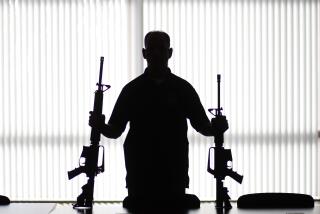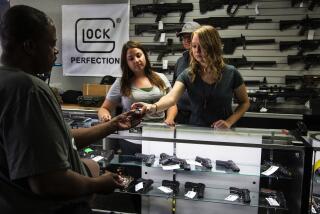Californians have a green light to sue the gun industry. How will that work?
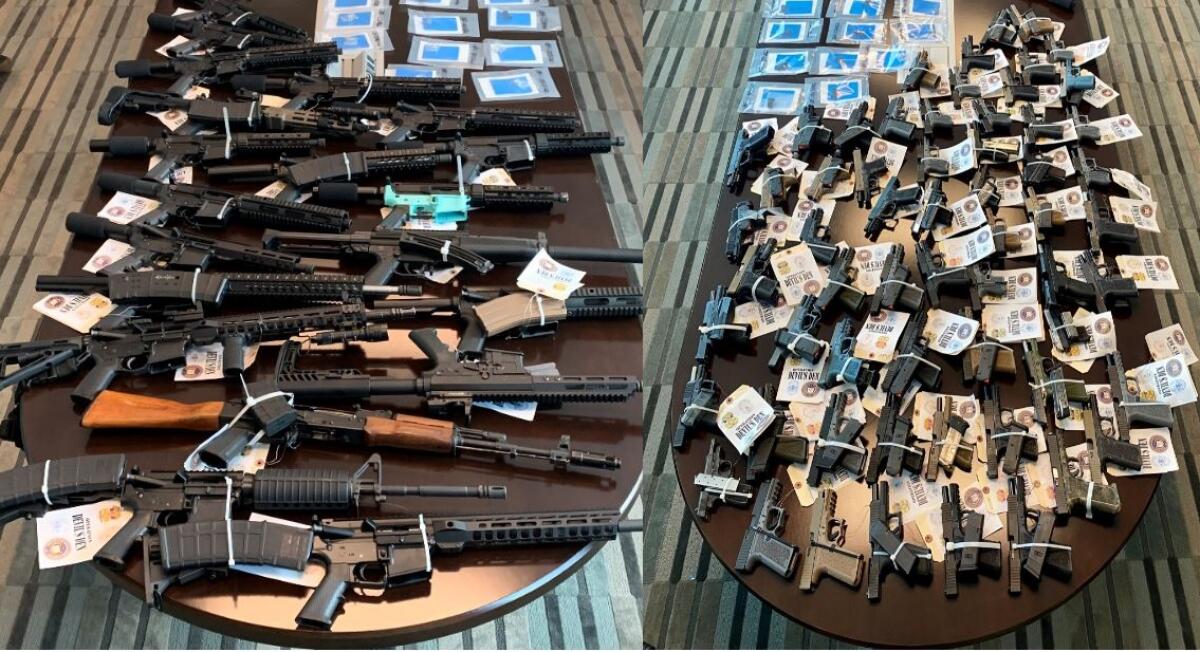
One of the strangest pieces of legislation ever enacted in California took effect Jan. 1, giving state residents and visitors the same power to threaten the gun industry that Texans now wield over abortion providers.
Even backers of the law say this isn’t an entirely good thing.
SB 1327 authorizes anyone other than state or local government officials to sue people who violate the state’s laws against the manufacture, distribution or sale of assault weapons, ghost guns and other banned firearms. Lawsuits could also be brought against gun dealers who violate the state’s law against selling or transferring weapons (besides hunting rifles) to anyone under 21 years old.
Supporters say this “private right of action” will make the state’s tough gun-control measures more effective by enlisting an army of grass-roots enforcers. And by barring state and local governments from filing SB 1327 lawsuits, they hope to make the law harder to challenge in court.
The law also exists to make a point, however.
Gov. Gavin Newsom sought the measure as a response to Texas’ SB 8, which empowers “any person” to sue those who perform or knowingly aid an abortion in that state after the fetus shows signs of cardiac activity. When the Supreme Court refused to throw out SB 8, Newsom (who sharply criticized it) called for California to use it as a model for a novel approach to gun control.
A look at California’s new laws on abortion, healthcare, criminal justice, workers and employees, minimum wage, civil rights, gun control and other issues that affect your daily life.
Some gun-rights advocates have called California’s law “performative legislation,” but Craig Peters, a partner at Altair Law in San Francisco and past president of the Consumer Attorneys of California, said SB 1327 “points out the absurdity” of Texas’ approach and the bad precedent it set. With the new law, he said, California is showing the rest of the country — and the Supreme Court — how the controversial methods in SB 8 can be applied to other rights.
SB 1327 is already scoring some of the legal points its supporters desired.
On Dec. 19, U.S. District Judge Roger Benitez in San Diego nixed one part of SB 1327 on constitutional grounds: the “fee-shifting” provision that would have saddled gun-industry litigants with all or part of the court costs from any suit challenging the state’s gun controls, even if they prevailed in court. The state attorney general’s office had refused to defend it, having argued that the Texas fee-shifting provision on which it was based was unconstitutional.
After Benitez handed down his ruling, Newsom issued a statement saying the judge had “confirmed” that the Texas law was unconstitutional too.
The rest of SB 1327 remains in effect, including the private right of action. Officials with National Shooting Sports Foundation and the California Rifle and Pistol Assn. said they are waiting to see how the law is used and had no plans to challenge it preemptively.
Here’s a rundown of how SB 1327 is expected to work, at least until the courts change the legal landscape.
Now that the Supreme Court has tossed out a New York law limiting who can get a permit to carry a gun, California’s rules are on shaky legal ground.
Who can be sued?
The answer depends on which violation of state law is at issue.
Lawsuits can be brought against anyone in California who knowingly manufactures, distributes, transports, imports, offers, sells or even lends an assault weapon, .50-caliber Browning machine gun or firearm without a serial number. So someone who knowingly builds an assault weapon for a California customer, sells one to someone in the state or delivers one to a buyer here could be sued.
Californians who buy assault weapons cannot be sued under the new law. But if you buy a ghost gun kit — or more technically, firearm precursor parts that aren’t federally regulated — you could be liable.
People who knowingly engage in conduct that helps someone violate these restrictions could also be sued, even if they didn’t know the person they were helping was going to violate the law, SB 1327 states. So, too, could suits be brought against anyone who sells, offers or transfers unregulated gun precursor parts.
For cases involving firearm sales in California to buyers under 21, lawsuits could be brought only against the licensed gun dealers involved.
Larry Keane, a spokesman for the National Shooting Sports Foundation, stressed that lawsuits under SB 1327 were limited to conduct that’s illegal in California. His group would take issue “if someone were to try to assert a claim against people outside of California for lawful conduct occurring outside of California,” he said.
For example, Keane said, imagine an AR-15 that’s manufactured legally in Connecticut, sent legally to a distibutor in Louisiana and a retailer in Nevada, then sold legally to someone in that state. If the gun found its way somehow into California and is misused, he said, SB 1327 wouldn’t allow you to sue the out-of-state manufacturer, distributor or retailer who complied with their state and federal laws; instead, you could sue only the person(s) who violated California law.
A new poll finds broad public support for a variety of gun restrictions, including many supported by majorities of Republicans and gun owners.
What can trigger a lawsuit?
Here’s where things really get interesting. According to the law, any “act or omission” that violates the strictures in SB 1327 constitute an injury “to all residents of, and visitors to, this state.”
In other words, you can sue even though you weren’t directly harmed. In fact, you can sue even if no one suffers physical injuries or financial harm — it’s enough just to show that someone violated the act’s gun controls by, for example, knowingly selling an assault weapon to someone in California, or by purchasing a ghost gun within the state’s borders.
Nor do you need to have a personal connection to the violation; you just have to be able to prove that it took place. For example, you could learn about an apparently illegal sale of an assault weapon to a California buyer by reading a newspaper story about a shooting, then use court documents and other public records to try to make your case against the seller.
Keane said it’s “still an open question” whether “somebody with no injuries would have standing to assert a claim as a private individual.” Peters agreed that the battle over that issue was still to come, and would probably reach the Supreme Court.
Until then, however, SB 1327 lets just about anyone file lawsuits, with no need to show that they’d personally suffered any harm.
California’s legalization of recreational cannabis in 2016 ushered in a multibillion-dollar industry. But many of the promises of legalization have proved elusive.
What are the potential damages you could collect?
If the lawsuit is successful, the law provides that the defendant must pay the plaintiff at least $10,000 per weapon or firearm part that violated SB 1327, as well as paying the plaintiff’s attorney fees and court costs.
Claims must be brought within four years of the actions that violated the law. And although any number of people could sue someone for the same violation, only one plaintiff can collect damages for it.
You may file an SB 1327 lawsuit in your home county, the county where a “substantial part” of the violation(s) occurred, the county where the defendant lives or, if it’s a company, where its main office is located.
Elon Musk’s crackdown on Twitter accounts tracking private jet movements highlights a flaw in the idea that wealth can buy freedom from scrutiny.
What defenses does the law provide?
Under SB 1327, defendants accused of helping someone violate the law can argue that they “reasonably believed, after conducting a reasonable investigation,” that the person they were helping was acting legally.
Otherwise, the law provides a long list of defenses that cannot be asserted, starting with not knowing or understanding the law. Nor can someone escape liability by arguing that they believed the law was unconstitutional. Also off the table: arguing that the firearm at issue wasn’t used or intended to be used unlawfully.
Finally, defendants can’t try to evade liability by asserting that the measure violates someone else’s 2nd Amendment rights unless the Supreme Court allows them to do so. And even then, the law states, they would have to show that the relief sought by the lawsuit would violate a 2nd Amendment right “clearly established” by Supreme Court decisions.
A stolen wallet precipitates a reporter’s years-long fight against identity thieves — and a system that doesn’t care and won’t help.
What sort of suits are we likely to see?
Peters said it’s not clear at this point how the law will be used. “There’s still a lot for us to figure out how to make this law work” to make communities safer, he said, adding, “There’s probably a lot more unknown than is known.”
If he had to guess, he said, the first targets of SB 1327 lawsuits will probably be the companies making and selling ghost gun kits in California. A number of lawsuits have already been brought against these defendants by people who were shot by someone using a ghost gun, Peters said, and those plaintiffs could add claims based on SB 1327 to their cases.
But such a claim could also be brought in a standalone lawsuit by someone who learned about an illegal ghost-gun sale in California by seeing a report in the news. (Firearms are required to have serial numbers in California, which the kits lack; the manufacturers and sellers argue that they make and sell kits, not firearms.) According to Peters, it’s an easier case to bring when you merely have to show that a law was violated, not that you were personally damaged in some way.
One other issue for the new law is whether the gun controls it was designed to enforce survive court scrutiny.
The Supreme Court’s decision in New York State Rifle & Pistol Assn. vs. Bruen this year appeared to render unconstitutional many state and local efforts to limit guns. Not surprisingly, gun rights advocates are challenging the state’s bans on assault weapons and firearm sales to people under 21, among other state gun controls.
About The Times Utility Journalism Team
This article is from The Times’ Utility Journalism Team. Our mission is to be essential to the lives of Southern Californians by publishing information that solves problems, answers questions and helps with decision making. We serve audiences in and around Los Angeles — including current Times subscribers and diverse communities that haven’t historically had their needs met by our coverage.
How can we be useful to you and your community? Email utility (at) latimes.com or one of our journalists: Jon Healey, Ada Tseng, Jessica Roy and Karen Garcia.
More to Read
Start your day right
Sign up for Essential California for news, features and recommendations from the L.A. Times and beyond in your inbox six days a week.
You may occasionally receive promotional content from the Los Angeles Times.

